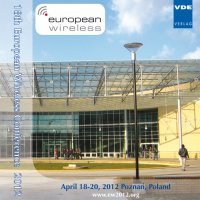On the performance evaluation of CSMA/E2CA protocol with open loop ARF-based adaptive modulation and coding
Konferenz: European Wireless 2012 - 18th European Wireless Conference 2012
18.04.2012 - 20.04.2012 in Poznan, Poland
Tagungsband: European Wireless 2012
Seiten: 8Sprache: EnglischTyp: PDF
Autoren:
Martorell, Gabriel; Riera-Palou, Felip; Femenias, Guillem (Mobile Communications Group, University of the Balearic Islands, Spain)
Barcelo, Jaume; Bellalta, Boris (Dept. of Information and Communication Technologies, Universitat Pompeu Fabra, Spain)
Inhalt:
Carrier sense multiple access with collision avoidance (CSMA/CA) has been the access protocol of choice for IEEE 802.11-based WLANs. In addition to channel sensing before transmission, the probability of a collision in these WLANs is typically reduced by the application of a binary exponential backoff (BEB) algorithm that randomizes the selection of the time slot in which a given station transmits. In a system without adaptive modulation and coding (AMC), the reduction in spectral efficiency caused by BEB is outweighed by the reduction in the number of collisions. In contrast, in systems using the ubiquitous auto rate fallback (ARF) AMC algorithm, which is unable to distinguish a collision from an erroneous transmission, the remaining collisions induce a dramatic drop in system performance. This degradation is caused by the utilization of low-rate transmission modes even when the channel conditions would permit the use of much higher-rate modes. In an attempt to further reduce the number of collisions, a variant of CSMAlCA, called enhanced collision avoidance (CSMAlE2CA), has been recently proposed. In this paper, a model approach to the performance evaluation of both BEB-based CSMAlCA and CSMAlE2CA, used in conjunction with ARF, is presented and validated. Results reveal the synergistic properties of the E2CA and ARF combination, as demonstrated by the superior good put performance when compared against other strategies. Index Terms - CSMA/E2CA, AMC, ARF, CSMA/CA, DCF, 802.11n.


